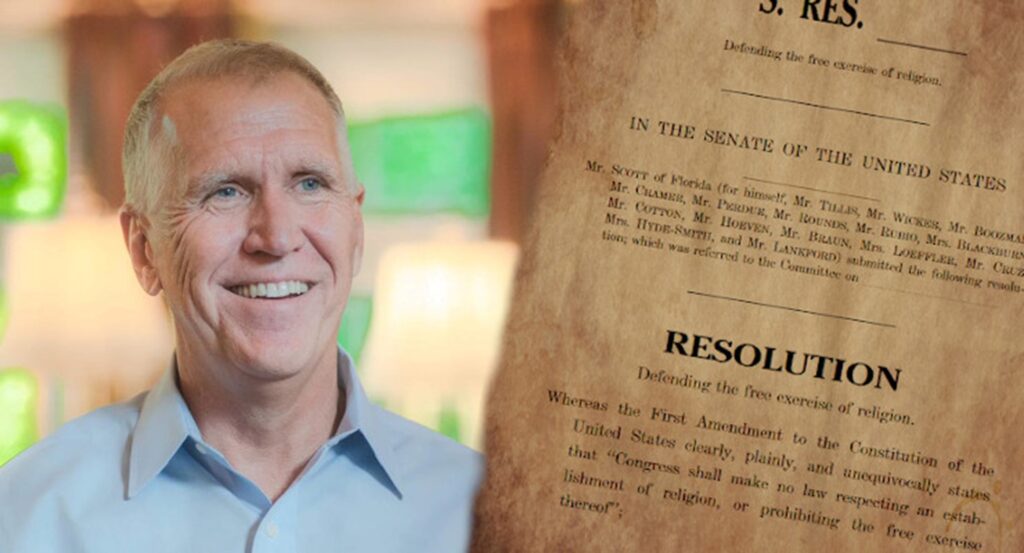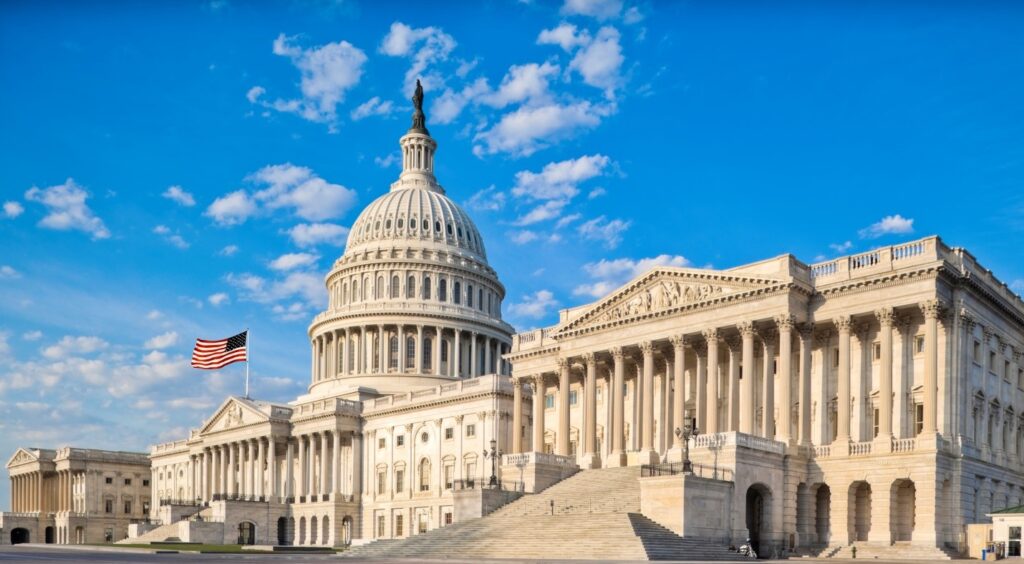
By M.H. Cavanaugh
Christian Action League
December 22, 2020
Last Friday, North Carolina’s U.S. Senator Thom Tillis (R) joined a resolution, led by Florida’s U.S. Senator Rick Scott. The resolution defends the First Amendment, more specifically, the right to exercise one’s faith freely.
“While this is a hard time for many, North Carolinians should still have their constitutional right to worship and freely exercise the religion they believe in,” said Senator Tillis. “Now more than ever, North Carolinians are leaning on their faith as we battle this pandemic, with many relying on their church for support. I am proud to join this resolution as we work to defend our constitutional right to religious freedom for every American.”
Rev. Mark Creech, executive director of the Christian Action League, said that conservative Christians would especially appreciate knowing of Tillis’ commitment to religious liberty. “I know Sen. Tillis,” said Rev. Creech. “He demonstrated his commitment to this great principle by his many efforts to free Andrew Brunson, the Christian missionary from our state who was wrongly imprisoned by the Turkish government. There is no question that he understands once this right is gone; we are no longer a free people.”
Rev. Creech added:
“In today’s America, one of our supposed highest virtues is tolerance, but that doesn’t extend anymore to those who believe in an orthodox view of Christianity. In 2003 David Limbaugh came out with a book titled, Persecution, a veritable encyclopedia of current assaults on religious freedom. Since that time, an entire set of books on the subject could have been added to it.
“Just last October, CNN host Chris Cuomo disparaged then-Supreme Court nominee, Amy Coney Barrett, as ‘no ordinary Catholic,’ with a ‘fundamentalist’ approach. Therefore, Cuomo advocated her nomination had to be rejected.
“Christian singer, Lauren Daigle, was just dropped from a New Year’s Eve celebration scheduled to be broadcast live from New Orleans when New Orleans Mayor, Latoya Cantrell, complained about a worship rally in which Daigle spontaneously participated a month earlier. Cantrell claimed it was because Daigle and the other participants held an ‘unpermitted’ rally that was allegedly endangering lives during the pandemic. However, the rally occurred in the same location that a protest took place in June, which the city allowed. Even Louisiana’s Attorney General, Jeff Landry, said Daigle was being targeted for her faith.
“During the pandemic, churches are being told that they can only have so many worshipers in their church sanctuaries. This is a clear and unprecedented hatred of religious devotion in our country. You see, if you are a devout Christian, if you believe the Bible and want to see others come to faith in Christ, and you aren’t willing to keep your religion to yourself, then you can go to the back of the bus.
“Nothing has been undermined more in our Constitutional Republic than the free exercise clause of the First Amendment.”

The resolution is a powerful statement in defense of the free exercise clause. It reads as follows:
RESOLUTION
Defending the free exercise of religion
Whereas the First Amendment to the Constitution of the United States clearly, plainly, and unequivocally states that “Congress shall make no law respecting an establishment of religion, or prohibiting the free exercise thereof”;
Whereas the constitutional protection of this bedrock principle of religious liberty was extended to the actions of the several States through the Fourteenth Amendment to the Constitution of the United States;
Whereas, despite the clear prohibition against laws infringing upon the free exercise of religion, houses of worship and religious organizations have been frequent targets of asymmetric restrictions by State and local government officials during the coronavirus pandemic;
Whereas irrespective of compliance with mask mandates, social distancing, and other protective measures to limit the spread of the coronavirus, houses of worship and religious organizations have been subjected to size restrictions or outright bans on in-person gatherings, which severely infringe upon the right of members to freely exercise their religion;
Whereas while houses of worship and religious organizations are subjected to severe restrictions under the guise of limiting the transmission of the coronavirus, businesses and secular activities enjoy substantially more favorable treatment by some State and local government officials, including –
- New York Governor Cuomo, who severely restricted the number of members who could enter a church or synagogue in color-designated zones, but imposed no size restrictions on ‘essential’ businesses, like acupuncture facilities, hardware stores, and liquor stores, and permitted other ‘non-essential’ businesses to define their own size restrictions;
- North Carolina Governor Roy Cooper, who required worship services involving more than 10 people to be held outdoors unless a church demonstrated doing so would be ‘impossible,’ but commercial shopping centers could allow people into the stores without limitation;
- California Governor Gavin Newsom, who prohibited or severely limited in-person worship services in counties with large numbers of coronavirus cases, but secular businesses and activities such as shopping malls, swap meets, and card rooms were permitted higher attendance;
- New Jersey Governor Phil Murphy, who prohibited or severely restricted indoor services by houses of worship because they were not deemed ‘essential,’ but commercial establishments like marijuana dispensaries and liquor stores were permitted to remain open;
- Nevada Governor Steve Sisolak, who imposed strict numerical attendance caps on houses of worship because they were not deemed ‘essential,’ but allowed casinos and amusement parks to operate at half-capacity without specific numerical limits on people within those facilities; and
- Mayor of the District of Columbia Muriel Bowser, who prohibited even outdoor religious services attended by more than 100 people, regardless of compliance with face-covering and social distancing requirements, but actively encouraged and participated in crowded political demonstrations attended by thousands of individuals;
Whereas the United States Supreme Court recently granted injunctive relief to 2 houses of worship in New York against the discriminatory actions by New York Governor Andrew Cuomo and declared ‘even in a pandemic, the Constitution cannot be put away and forgotten”; and
Whereas for millions of people of the United States, churches, synagogues, and houses of worship are more than just buildings, and the ability to gather together in prayer for people of all faiths, creeds, and beliefs must not be diminished or impeded by the whims of government officials: Now, therefore, be it
Resolved, That the Senate —
- affirms its support for the rights, liberties, and protections enshrined in the United States Constitution; and
- commits to vigorously defend the right of all people of the United States to engage in the free exercise of religion.
